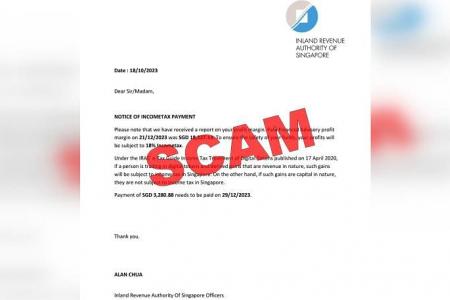$2.3 million lost to Iras impersonation scams in 2023
At least 52 people fell prey to scammers impersonating officials from the Inland Revenue Authority of Singapore (Iras) in 2023, with losses amounting to around $2.3 million.
Iras said on March 19 that it has also seen an increase in scam attempts on taxpayers during the current tax filing season, which runs between March 1 and Apr 18.
Based on reports made to Iras by the public in 2023, 79 per cent of scams involved victims being offered tax refunds, and 15 per cent were of victims being asked to pay capital gain tax or income tax on investment-related profits.
Five per cent of reports were related to phishing e-mails, while the other one per cent includes variants such as fake stamp certificates and forged tax documents.
In February, The Straits Times reported that the number of scam cases in Singapore hit a record high in 2023, since the police began tracking cases in 2016.
For tax refund scams, victims would receive e-mails from scammers claiming that the victims had been overcharged earlier on income tax or goods and services tax and offering refunds to them.
The victims would be directed to a fake website that resembles the Iras portal, and prompted to provide their payment details and one-time passwords.
Since the start of 2024, at least six people have fallen prey to this scam variant, with losses totalling at least $3,000.
Iras said that tax refunds are not credited to debit or credit cards. Instead, they are automatically credited to taxpayers via PayNow or their bank account registered with Iras.
Information on tax refunds is also not sent via e-mail, said the tax agency, adding that information can be retrieved from the myTax Portal.
Scammers have also contacted victims via e-mail or messaging platforms to trick them into paying capital gain tax or income tax on their investment profit or dividends. These scammers usually claim to be linked to cryptocurrency investment companies, financial institutions, or Iras.
“Be aware that there is no capital gain tax on profits earned from the sale of investments and shares in Singapore,” said Iras.
Profits from other financial instruments such as digital tokens are also generally not taxable, as they are considered personal investments, it added.
Members of the public are advised to do their own checks on unfamiliar financial institutions by using resources such as the Financial Register of Representatives and Investor Alert List that can be found on the Monetary Authority of Singapore’s website.
“Scammers continue to evolve their tactics and become more sophisticated with new technology, products and services,” said Iras.
“Tackling scams is a community effort and individuals, businesses, and organisations should be informed on the modus operandi of common scam types, and be vigilant to protect yourself and each other.”
Iras also advised taxpayers to use the myTaxPortal to view and manage their tax transactions, and correspond with the agency through myTax Mail on any queries.
It added that confidential documents such as tax return forms, notices of assessment and refund letters will never be sent via e-mail, and will only be available on the myTaxPortal.
Get The New Paper on your phone with the free TNP app. Download from the Apple App Store or Google Play Store now


